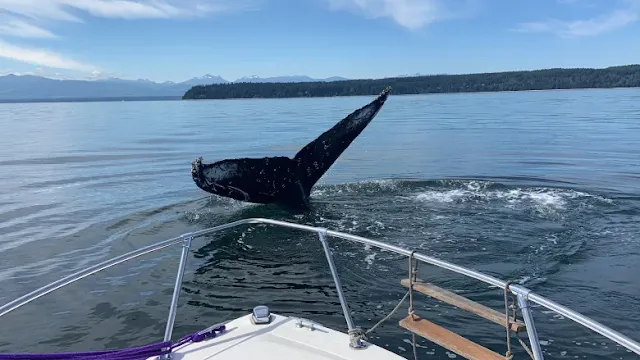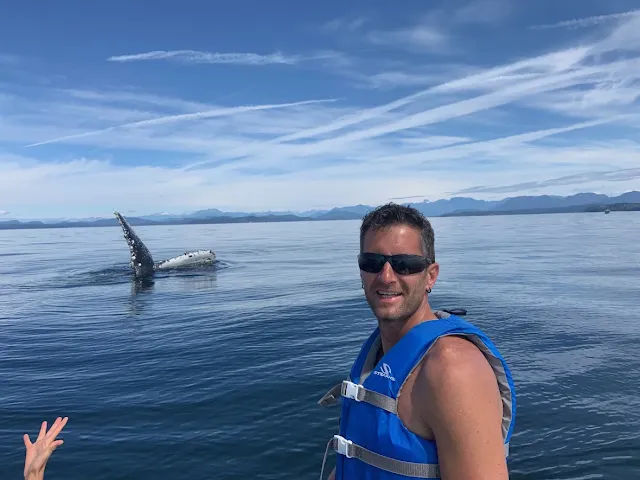The humpback whale was eventually recognized as a juvenile male called
Neowise by a marine expert.
Off the coast of Vancouver Island, a B.C. family had an exciting encounter
with a humpback whale that spent over an hour rubbing up against their boat,
turning around, and flailing its fins.
On Tuesday, a whale became friendly to Aleks Mount as he and his family
were whale watching northeast of Campbell River.
Mount said that he quickly cut off his engine once they noticed the
humpback from a distance of roughly 100 meters, aiming to maintain a safe
distance.
But the whale dove underneath, emerging below their boat less than a minute
later.
Mount claimed that at first, he and his family were afraid of the monster,
which he likened to a school bus in size.
The boat will be in the air with just a flip of the tail, according to
Mount.
In Mount's camera clip, the whale can be seen circling and flipping inches
from the boat and occasionally showering the boat with water.
"I only needed to touch it. It was only softly bumping up against the boat,
submerging and emerging, "Mount, a passionate whale watcher for roughly four
years, said.
Mount knew he was stuck since he had no idea how the whale would respond to
the unexpected engine noise and was concerned the propeller of the boat
would accidentally sever the whale.
Thus, they waited and observed.
Fortunately, the whale only struck the boat with its fin once, leaving only
a tiny bend and a few minor scratches in the railing.
The humpback to Mount was subsequently recognized as a juvenile male called
Neowise by a marine expert.
They were quite lucky, according to Mount, that the whale was so cognizant
of its body and didn't cause further harm.
It was incredibly nice to share that experience with others, said Mount.
"I'll forget my name and who I am before I forget this," he said.
amiable giants
Despite receiving a few stories of humpback whales interacting with boats
recently, Andrew Trites, director of the marine mammal research section at
the University of British Columbia, said that this is the closest humpback
he has ever observed.
Nothing quite as remarkable as this one, Trites stated.
Trites speculates that the whale may have been drawn to the depth sounder
on the boat, which uses sound waves to gauge the depth of the water
underneath it.
According to Trites, the high-frequency waves resemble the whales'
vocalizations.
According to Trites, "the humpback whale seems to view this as another
living creature that is virtually its own size, and it is something it can
engage with."
Before turning the boat off when he noticed the whale, Mount made sure his
depth sounder was turned on.
According to Trites, whales may not have complete control over the location
of their tail and fins, creating a potentially deadly condition.
These are gentle giants, yet they have the capacity to cause a lot of harm
accidentally, according to Trites.
According to Trites, humpback whales were hunted to almost to extinction
around a century ago and have only just begun to resurface off the coast of
British Columbia.
Trites said that education is essential to fostering a respectful
connection with whales as more people come into contact with them.
When a boat sees a whale, he advises keeping a safe distance and moving
slowly. He suggested turning off the depth sounder as one method to achieve
this.
Boaters must maintain a distance of at least 100 meters from whales,
according to Canadian marine mammal regulations. Boaters should keep 200
meters away, according to the North Island Marine Mammal Stewardship
Association.
Will you be my partner?
Trites claims that playful behavior is common among juvenile male humpback
whales.
He claimed that although these humpback whales mate during their winter
migration south, young males frequently spend time honing their courtship
sounds before mating season.
Trites speculated that the young man could have been singing to the
boat.
They must practice with a partner, so why not a boat?
The Marine Education and Research Society's research suggests that the
whales' amicable behavior in the Campbell River region may possibly be
related to their nutrition and the foods they consume.
Tags:
animals



.webp)